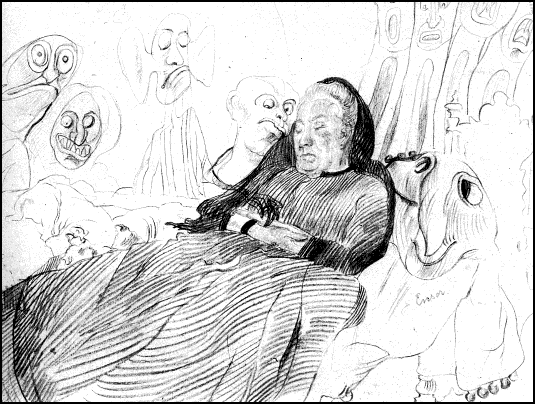Sybil Lockhart

I glance uneasily about, my eyes avoiding her body. I have anticipated and avoided this moment. I've been watching the steady degradation of Ma's personality: The Loss Of. The loss of passion, the loss of opinions, of esteem, of self-esteem; the loss of self. I'm afraid of seeing my old mom so vulnerable, so weak: naked. I fear the sight of her sagging, flaccid, spotted flesh. At the same time, I regard her body with a morbid fascination. It shocks, it unearths me, to experience this slow but monumental shift from my laughing, competent, mother to a passive, humorless stranger. Her body will give me confirmation of her minds deterioration, I think, when I witness that fragile old skeleton drooping with the flesh of the infirm.
So I look. And I look again, surprised. Her legs are full and alive. Their fleshy, muscled thighs and calves are shaped familiarly like my own. Something shifts inside me.
As she removes her bra, her fingers calmly following a course set by many decades of habit, she seems to give her nakedness before me about as much thought as Cleo does when I change her diaper. Out of Ma's bra emerge two full, round breasts, several sizes larger than mine, just as they always have been: big, earthy breasts. Why did I expect wrinkled tubular sacks hanging down to her bellybutton?
There she stands, a still-attractive, shapely woman. She stoops only slightly. Without her clothes, she is fully physical, generously feminine. Her grey hair falls sweetly to her shoulders as she slips into the blue gown. She climbs onto the doctor's table, tissue paper crackling under her, and leans back with a sigh, and I surge with renewed affection. My mother has grace; she has a natural, innocent composure. Her animal body has an ease that her worried mind no longer possesses. Her yellow chipped teeth, her greying hair, her muddied thoughts, cannot override the simple, beautiful fact of her womanhood.
I was at home with my two young children when my mother was diagnosed with Alzheimer's disease. My girls helped to refill the well, not just by cheering up the gloomy moments but also by loving their grandma without judgment. I am also a member of a wonderful group of Berkeley writers called Motherlode. Writing and talking with them about child rearing, caregiving, and everything in between saved me again and again.
Poetry and Prose about
Alzheimer's Disease
Holly J. Hughes, Editor
© 2009 Kent State University Press